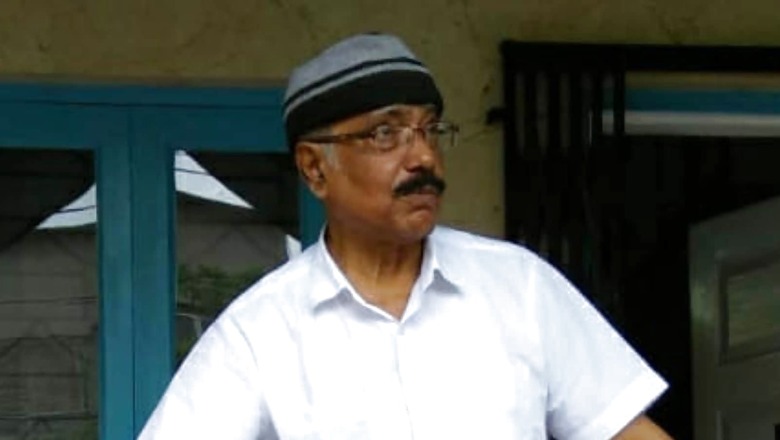
views
Former CBI additional director Upen Biswas has grown up on stories of affluence of his ancestral house in Gopalgunj district in Bangladesh.
His father Nivaran Chandra Biswas’s large tracts of cultivable land, unadulterated milk, ghee, and other by-products from the household dairy firm, fresh fish from the large family pond, and the respect for the family name that comes from more than a century of being part of the landed gentry.
Then, Nivaran’s popularity in the area could be imagined with the fact that Sheikh Mujibur Rahman (first president of Bangladesh) used to visit his house when Upen was young and studying in Class 5.
However, Nivaran’s affluence falls under rough weather after the 1964 East Pakistan Riots. Then, Upen was 22 years old and the agony of what his father – a well-known merchant — had to leave behind in erstwhile East Bengal, which became East Pakistan after Partition, and subsequently became Bangladesh continue to haunt Upen still today.
Theirs is not the only family that would have stories to share of a forgotten prosperity, which had to be forgone by many that risked life and livelihood for safety from communal violence that left millions dead on both sides of the border.
The 1964 East Pakistan Riots (ethnic cleansing of Bengali Hindus from East Pakistan) happened in the wake of an alleged theft of Prophet’s hair from the Hazratbal shrine in Jammu and Kashmir.
The same year, Upen completed his graduation and as per his family trend his father asked him to pursue law from Kolkata and then from London.
Unfortunately, due to the riot, Upen was asked by his father to hide in a ‘safe house’ 15 miles away from his house at Ulpur village (in Bangladesh’s Gopalgung district) because alleged Muslim fundamentalists backed by Abdus Sabur Khan (former communication minister of Pakistan and leader of Muslim League) were selectively targeting the Hindus following Hazratbal shrine case in Jammu and Kashmir.
In January 1964, when Upen returned home the same night and a big meeting was held where half of the people of entire Gopalgung district were present.
It was decided, mostly by the elders and by his father Nivaran, that Upen will take the leadership against those who are behind the riot and he will not leave his village to pursue higher education in Kolkata and in London, according to his family tradition.
A section of eminent personalities at the meeting told Upen that so far his father Nivaran used to take the lead to protect the sentiments of the ‘brothers’ and ‘sisters’ in his Ulpur village and now it’s his turn to stand against the divisive forces in the society.
The villagers asked for an assurance from Upen and he promised that he will not leave them alone and he will stay with them in the village to protect the people.
In the meantime, a section of Muslims, who were close to Nivaran, tipped him that the rioters are plotting to kill Upen. His mother Sarojini Biswas shook out of fear and fell on her husband’s feet and requested that Upen should immediately be sent to Kolkata for his safety.
A reluctant Upen was forced to leave his house and his mother told him, “Upen never come back to Bangladesh”.
And, after that Upen never entered his village.
The guilt of betraying his villagers despite promising them to fight against the divisive force continues to haunt Upen even today.
“Ami protisruti rakhte pari nai…Ami pheri jete chai… (I betrayed them for my safety… failed to keep promise…I want to go back),” Upen said. “It hurts me a lot today”.
While recalling about that ill-fated day, Upen said, “My father was reluctant but he could not turn down my mother’s request. I took a boat to Khulna and from there I took another one to Kolkata. I surrendered my passport having ‘F’ category VISA and after that I never went back.
“In 1970, our house was bulldozed by the communal troublemakers…my father narrowly escaped…our boatman was killed…situation further aggravated and in 1971 (during war) my father and mother came to Kolkata. We stayed in a house in Madhyamgram in North 24-Parganas and here in Kolkata too my Mujibur met my father and on his assurance my father once again went back to Bangladesh to look after his business. However, after few years my parents again came back (as the situation was not conducive in Bangladesh). Both of them passed away in Kolkata,” he said.
Upen Biswas, a 1968 batch IPS officer of West Bengal cadre, first came into the limelight for pursuing former chief ministers of Bihar Jagannath Mishra and Lalu Prasad Yadav’s involvement in the Rs 950 crore fodder scam.
Upen is known as anti-corruption crusader and has dedicated his entire life in fighting corruption.
Read all the Latest News , Breaking News and IPL 2022 Live Updates here.




















Comments
0 comment